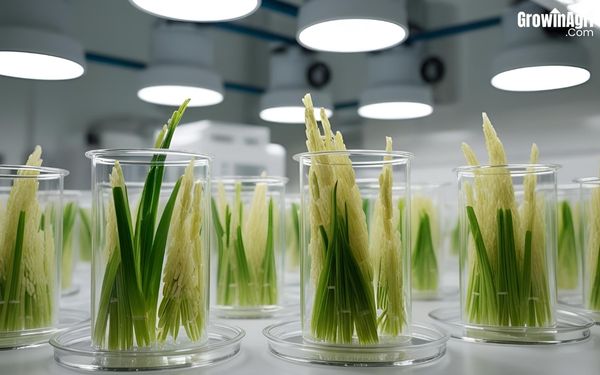The Indian Council of Agricultural Research (ICAR) has taken a major leap forward in rice cultivation with the launch of two new genome-edited rice varieties. Designed to tackle the growing challenges of climate change, water scarcity, and soil salinity, these varieties are not just scientific achievements — they are game changers for Indian farmers.
Let’s explore what makes these new rice varieties special.
Pusa Rice DST1 – Less Water, More Resilience
Developed by the team at ICAR-Indian Agricultural Research Institute (IARI), New Delhi, led by Dr. Viswanathan C., Pusa Rice DST1 has been created using CRISPR-Cas9 technology. This variety is tailor-made for regions facing water shortage and soil salinity.
What sets it apart is its ability to thrive on less water, thanks to its lower stomatal density. It grows faster with more tillers, larger leaves, and produces a higher number of grains. Even in the absence of stress conditions, it delivers a strong yield — and under drought or salt stress, it still performs reliably. This is the kind of innovation that can make a real difference for farmers working in tough environments.
DRR Dhan 100 (Kamala) – High Yield Meets Early Maturity
The second breakthrough, DRR Dhan 100 (Kamala), has been developed by ICAR-Indian Institute of Rice Research (IIRR), Hyderabad. Dr. Satendra K. Mangrauthia, Dr. R.M. Sundaram, and their team used SDN1 genome editing to enhance the popular Samba Mahsuri variety.
DRR Dhan 100 isn’t just another high-yielding rice — it offers a 19% increase in grain yield and matures 15 to 20 days earlier than its predecessor. It also comes with moderate drought tolerance and retains the high grain quality that Samba Mahsuri is known for. For farmers, this means better returns in less time, with the added benefit of resilience in uncertain weather.
A New Era for Indian Rice Farmers
These two varieties reflect how science and agriculture can work hand in hand to solve real-world problems. With climate conditions becoming more unpredictable, and natural resources like water becoming scarcer, the need for such resilient crops has never been greater.
ICAR’s efforts in developing genome-edited rice varieties like Pusa Rice DST1 and DRR Dhan 100 show a strong commitment to sustainable and future-ready farming. For farmers across India, especially in vulnerable regions, these innovations offer hope — and the promise of better productivity, profitability, and peace of mind.
Join Our WhatsApp for More Details…






